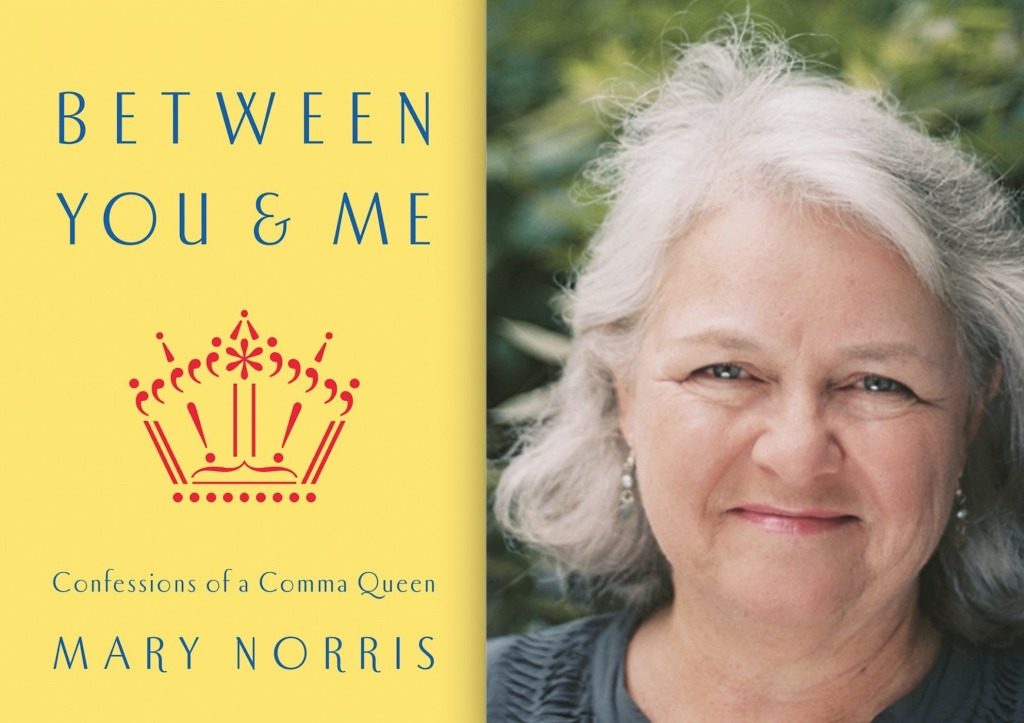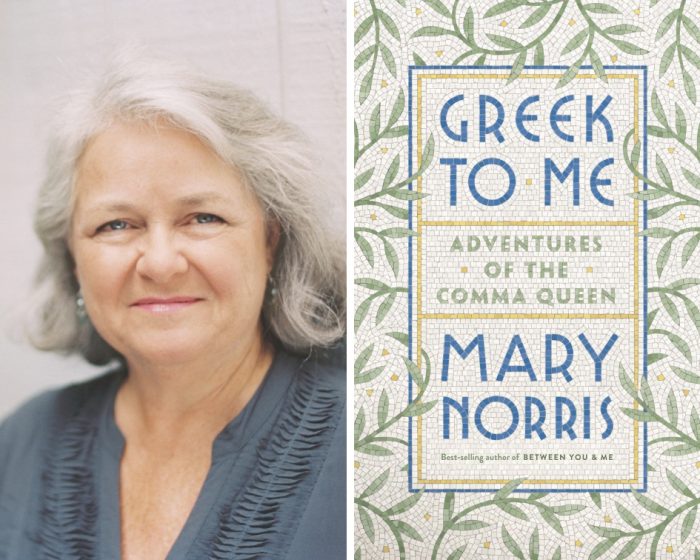

Mary Norris has worked for The New Yorker since 1978, mostly as a copywriter. Norris edited the work of John McPhee, George Saunders, Ian Frazier, Mark Singer, Emily Nussbaum, Jon Lee, Calvin Trillin, Karen Russell, Ben McGrath, and dozens more. In Between You and Me, Norris writes about her love of grammar and how she managed to score her dream job. In later chapters, Norris explores burning questions like who put the hyphen in Moby-Dick and why are there so many commas in so much of our writing.
The comma was invented by Aldo Manuzio, a Venice printer, in 1490. Maruzio was working on printing Greek classics and found that using a comma (in Greek, komma means “something cut off”–a segment) made the passages less confusing. Over time, Norris is convinced that people insert too many commas in much of their writing.
My favorite chapter is Chapter 7: A Dash, a Semicolon, and a Colon Walk into a Bar. Norris analyzes how Emily Dickinson used dashes in her poetry and how Henry James used colons and semi-colons so effectively. GRADE: A
In It’s Greek to Me, Mary Norris writes about her love affair with Greece and the Greek language. I found It’s Greek to Me less interesting and less compelling than Between You and Me.. Are you a fan of grammar? GRADE: B
TABLE OF CONTENTS TO BETWEEN YOU AND ME:
Introduction: Confession of a Comma Queen 1
Chapter 1 Spelling Is for Weirdos 15
Chapter 2 That Witch! 35
Chapter 3 The Problem of Heesh 57
Chapter 4 Between You and Me 77
Chapter 5 Comma Comma Comma Comma, Chameleon 92
Chapter 6 Who Put the Hyphen in Moby-Dick? 111
Chapter 7 A Dash, a Semicolon, and a Colon Walk into a Bar 131
Chapter 8 What’s Up with the Apostrophe? 147
Chapter 9 F∗ck This Sh∗t 157
Chapter 10 Ballad of a Pencil Junkie 169
Epilogue: The Million-Dollar Copy Editor 193
Acknowledgments 201
Notes 205
Appendix: Some Books I Have Found Particularly Helpful 213
Index 217
TABLE OF CONTENTS TO IT’S GREEK TO ME:
Invocation 1
Chapter 1 Alpha to Omega 19
Chapter 2 A Is for Athena 42
Chapter 3 Dead or Alive 66
Chapter 4 Demeter Dearest 97
Chapter 5 A Taste for Tragedy 122
Chapter 6 Swimming with Aphrodite 149
Chapter 7 Acropolis Now 176
Chapter 8 The Sea! The Sea! 201
Acknowledgments 223
Appendix The Greek Alphabet 227
I don’t notice grammar much when reading. The exception is when someone uses way too many exclamation marks! Read the first chapter of The Da Vince Code. Dozens of them! Never got past that first chapter.
I agree! DA VINCI CODE was awful! I never got past chapter one either!!!
I don’t think it was the excessive exclamations as much as the generally horrible writing. The self-flagellation didn’t help.
Jeff, I’ve struggled through a handful of Dan Brown’s books (and the Tom Hanks movie versions). But the Reading Public seems immune to horrible writing.
Steve, I confess I’m prone to exclamation marks. I’m just an excitable boy!
I enjoyed it, but I listened to it as an audiobook, so I didn’t “see” the grammar.
Rick, I have a stack of audio books waiting for me to listen to them. In the On-Deck Circle is GRANT…30 CDs!
I edit In my head as I read—it’s the only way to make it through! Recently, I was reading a book (quite a good one, rather angsty, about a separated couple on the verge of divorce) with a hero named Theo. At more than one place in the book, the heroine referred to the home she shared with Theo as “Theo and I’s house.” Yikes! Amazingly, the writer thanked her “godmother of grammar” in the acknowledgements—to which I responded, “You better check your godmother’s credentials.”
I belonged to a writer’s group where grammar was revered above story, character, words even. Instead of telling me why my plot did or did not work, they would focus on grammatical issues and eventually I came to hate grammar.
Of course, diagramming sentences for years in school set me on a path to dislike it although see its usefulness.
If you use more than one or two exclamation marks in a book, it is too many. The words should convey excitement if you’re doing it correctly. Or that’s what I leaned in writing classes. Of course, in blog or casual writing, they are perfectly fine.
Patti, I had a High School English teacher who loved to diagram sentences on the Blackboard. Not a day went by without her long, fragmented diagrams eating up all the chalk in the classroom. I learned more about English grammar from taking Latin for two years than sentence diagrams.
Yikes is right! “Theo and I’s” should make anyone cringe. That’s just awful.
Yes, I am a grammar nut, like the late Bill Crider (and Deb). EATS, SHOOTS AND LEAVES is a favorite. How can you not love the internet? I just went to the Brooklyn Public Library site, found the book (BETWEEN YOU & I) was available through OverDrive, checked it out, downloaded it to the Kindle, and never had to take a step from the dining room here in Florida.
Jeff, I love the Internet, too. You sent me a NY TIMES article on that guy collecting First Edition books by Thomas Browne. After reading it, I ordered the Penguin copy of Browne’s “greatest hits” from AMAZON. It should arrive tomorrow (unless the snow storm delays it). Thanks again for that wonderful article!
Deb, I used to wince at some of my students’ grammatical faux-pas. Confusing “their” and “there’re” and “its” and “it’s” were the most common errors.
Just go to the supermarket and read the handmade signs. As for grammar, once you learn the rules, most things are not that hard. I mean, if you learn the difference between infer and imply, you should never mix them up, right? Yet people on television do, and often.
I had a junior high English teacher who drilled the rules of grammar into my head and, though I’ve long since forgotten the reasons why one construction or word is right and another is wrong, I still remember what sounds right or looks right on the page. Although I haven’t read “Between You and Me”, many of the chapter titles are so familiar that I’m sure I’ve read them somewhere, probably in The New Yorker. Norris is a wonderfully appealing and witty writer, and I should probably read the whole book.
Michael, Norris writes well and provides many entertaining grammatical examples of her craft.
Alas, I am, guilty of using too, too, too, too, many, commas.
Re: “Theo and I’s” The atrocity of I’s seems to becoming common among young people. I’ve heard it too often in conversation from those who should know better.
And can I rant about the use of “they” as a personal identifying pronoun?
Great googly-moogly, I’m a grumpy old fart.
Yes! (Obviously I agree with George on exclamations.) WTF is the deal with “they” as a “personal pronoun”? I think it started with the “person” on BILLIONS, but now it is everywhere! You are a single person, right? You don’t want to “identify” as male or female, but surely “they” implies more than one person, right?
Jeff, I feel exactly the same way you do about “they.” I understand the motives, but I dislike the execution grammatically.
Jerry, I’m convinced “texting” has done more to erode spelling and grammar skills than all of Trump’s speeches. And the movement to introduce “they” as a global pronoun rankles me.
“Do you herd sheep?” my Grandma asked,
My Grampa leaped in fright.
“That grammar’s wrong!” to me he said,
” ‘Have you heard sheep?’ is right!”
Walt Kelly
Dan, I always liked Walt Kelly (no relation) and his observation: “Suspicion is the mother of invention.”
George, thanks for reviewing this book. I’d definitely love to read it. Unlike my wife, an experience English and communications teacher, my grammar is not very good. I can write a grammatically correct sentence though I wouldn’t be able to tell you why it is so. I write mostly by instinct.
Prashant, you’re a Lucky Guy to have a wife who can edit you!
I have Between You and Me on the iPad an an ebook and have read about half of it. What I’ve read, I’ve enjoyed.
They as a one person pronoun is a result of the movement to not identify gender in language, nor use the he/she, him/her forms. It’s ridiculous, but so is “humankind” instead of “mankind”. I have nothing against feminism, but in some instances, they have a lot to answer for.
Rick, I understand the intent of “they,” but I would prefer a more natural and less jarring alternative.
George, you should try Hungarian – that language only has one word for he/she/it: ö … 🙂 🙂
Re grammar:
The comments about commas remind me of an old joke:
What’s wrong with this sentence:
Let’s eat grandma!
Wolf, Latin has some aspects that could come in handy with English and Hungarian.
This is going to sound stupid, but after reading her introduction, I think I may have already read the book! I definitely read the introduction before – how could I forget the cows or the cheese factory? – but I will have to read on to see if the rest is familiar too. I don’t have my non fiction book list with me so can’t check it there.
Jeff, I keep track of my reading with a Microsoft ACCESS data base. Yet, from time to time, I find myself in your situation: reading a book I’ve already read!
I just read an entry on Facebook where a poster used “exasperate” when he meant “exacerbate.” Let someone else correct him, I do it too often! I agree with Patty that one or two exclamation points in a work of fiction are more than sufficient! That nut Avallone would use 20 or 30 at the end of ONE sentence! I only use them here because George’s enthusiasm is so infectious!!!
Bob, I try to curb my enthusiasm, but exclamation points just flow out!
One exclamation mark early in a book is usually enough to turn me off. As for the use of commas, I am always fighting with myself on the need for them when I am writing my sports column. That happened again yesterday while editing. Now I will have to go back and take another look before I file it tomorrow. You mentioned that Norris edited John McPhee. I enjoyed his book titled Draft No. 4 about the writing process so much when I got a copy from the library that I had to have it for my library. A copy arrived this past week and I look forward to reading it again. Track it down if you haven’t read it. Now I want to read the Norris book.
Kent, I read DRAFT NO. 4 a while ago. I’ll reread it and post a review on this blog. Thanks for the reminder!